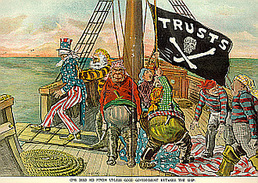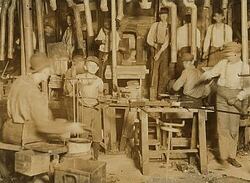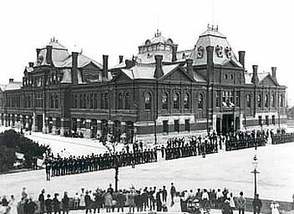Gilded Age and Progressive Era
|
Home
Profiles * Political Thought * Colonial Government * Revolution * Constitution * Birth of Party Politics * War of 1812 * James Monroe: "Era of Good Feeling" and Monroe Doctrine * Jacksonian Democracy * Regional Conflict and Compromise * 1860 Election of Abraham Lincoln * Civil War 1861-62 * Civil War 1863-65 * Reconstruction and Impeachment of President Johnson * Gilded Age and Progressive Era * 1912 Election of Woodrow Wilson * 1916 Election and World War I * Women's Suffrage * Depression and 1932 Election of Franklin D. Roosevelt * Prelude to World War II * Pearl Harbor and Mobilization * World War II: European Theater * World War II: Pacific Theater * Atomic Bomb and End of World War II * 1948 Truman-Dewey Election * 1960 Kennedy-Nixon Election * 1964 Johnson-Goldwater Election * Civil Rights Movement * Vietnam: Evolution of the American Role * Vietnam: Kennedy Administration and Intervention * Vietnam: Johnson Administration and Escalation * Vietnam: Nixon, Ford and Fall of South Vietnam * 1968 Humphrey-Nixon Election * Watergate Scandal and Resignation of President Nixon * 1976 Carter-Ford Election * 1980 & 1984 Reagan Elections * Clinton Impeachment * 2000 Bush-Gore Election * War in Iraq * 2008 Obama-McCain Election |
|
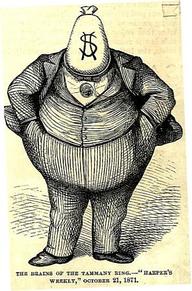 Cartoon by Thomas Nast in 1871 caricaturing Tammany Hall Democratic Boss William Tweed
Image: Harper's Weekly, private collection Cartoon by Thomas Nast in 1871 caricaturing Tammany Hall Democratic Boss William Tweed
Image: Harper's Weekly, private collection
Progressive, so-called "muckraking" authors and journalists also played key parts in highlighting specific economic and social ills which led to government action. Jacob Riis exposed the poor living conditions of the tenement slums in How the Other Half Lives (1890), helping enactment of legislation establishing minimum safety and housing standards in tenements. In The Shame of the Cities (1904), Lincoln Steffens described the rampant political corruption in the party machines of Chicago and New York serving the interests of businessmen who sought government contracts and special privileges. Upton Sinclair's novel published in 1906, The Jungle, traced the exploitation of an immigrant family and the unsanitary practices prevalent in Chicago's meat packing industry, which contributed to the approval in 1906 of the Pure Food and Drug Act and the Meat Inspection Act, the first laws to set minimum standards for food and drug production. The cartoonist Thomas Nast, featured often in the pages of Harper's Weekly, frequently targeted political corruption, particularly that which flourished in New York City under the direction of Boss Tweed of the Democratic Tammany Hall machine.
All day long this man would toil thus, his whole being centered upon the purpose of making twenty-three instead of twenty-two and a half cents an hour; and then his product would be reckoned up by the census taker, and jubilant captains of industry would boast of it in their banquet halls, telling how our workers are nearly twice as efficient as those of any other country. If we are the greatest nation the sun ever shone upon, it would seem to be mainly because we have been able to goad our wage-earners to this pitch of frenzy.” Upton Sinclair, The Jungle |
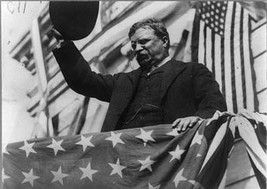 Theodore Roosevelt shown campaigning Image: Library of Congress Theodore Roosevelt shown campaigning Image: Library of Congress
Progressive political leaders included Wisconsin Governor and Senator Robert M. La Follette, who sought to weaken the control of political machines and promote wider citizen participation in the electoral process. In several states, particularly in the West, progressive reformers advocated forms of direct democracy, such as authorizing citizen groups through "Initiative and Referendum" to propose new laws or to review the actions of legislatures by obtaining sufficient citizen signatures on petitions to allow voter referenda on specific issues. In 1898, South Dakota became the first state to amend its constitution to provide for popular initiative and referendum for enacting and rejecting statewide legislation. Progressives also successfully lobbied for the direct election of U.S. senators by the voters enacted through the 17th Amendment to the Constitution ratified in 1913, replacing the former system by which members of the Senate were elected by each state legislature. Reformers in many states also pushed through systems to allow for the recall of elected officials.
Theodore Roosevelt and Election of 1912 Perhaps the most prominent Progressive was Theodore Roosevelt, the vice president who ascended to the presidency in 1901 at the age of 42 following the assassination of President William McKinley. A member of a wealthy, aristocratic Dutch family, Roosevelt broke from the pro-business policies of of his own Republican Party and targeted monopolistic business practices for reform. During Roosevelt's Administration, over forty major corporations were sued for antitrust or price-fixing violations and he took pro-labor positions in intervening to settle major strikes. Roosevelt left the presidency in 1908, succeeded by his vice president and hand-picked successor, William Howard Taft. Roosevelt later split with Taft, however, claiming that the Republican Administration had departed from the progressive course to align itself again with big business interests. When he failed to defeat Taft for the Republican nomination in 1912, Roosevelt ran an independent campaign under the Progressive Party, popularly known as the "Bull Moose" party after Roosevelt's boast that he was "fit as a Bull Moose" to run for the presidency. But the division of the Republican vote insured the victory of the Democratic ticket headed by New Jersey Governor Woodrow Wilson. See also Election of 1912 |
|
Resources
* The Progressive Movement (1900-1918) >> PBS * TR: The Story of Theodore Roosevelt >> PBS * Strike at Homestead Mill >> PBS * The Campaign and Election of 1912 >> Miller Center, University of Virginia Education * Photographs of Lewis Hine: Documentation of Child Labor: Teaching with Documents >> National Archives |
